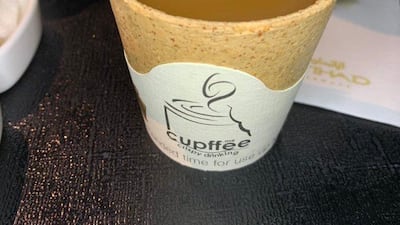Etihad Airways completed the world’s first ultra-long-haul flight on Monday morning without single-use plastic, touching down in Brisbane, Australia, in time to mark World Earth Day on April 22.
The 14-hour flight which took off from Abu Dhabi on Sunday night was the first stage in Etihad’s plan to reduce single-use plastics by 80 per cent by the end of 2022.
The National's Louise Burke was on board. From edible cups to toothpaste tablets and aluminium trays, see how Etihad went single-use plastic-free it in the video above.
Almost 100 plastic items on board were substituted for sustainable alternatives, from the bags that normally hold reusable headsets, to cups, cutlery and toiletries.
Among the new items were edible wafer coffee cups from Cupffee, blankets made from recycled plastic bottles and sustainable amenity kits from Buzz, an in-flight product supplier.
Toothpaste was provided in chewable tablet form in recycled cardboard boxes and toothbrushes made from a wheat straw composite were given to each passenger.
Economy class meals were provided on reusable trays, with aluminium containers, bread rolls in paper bags and lightweight steel cutlery in paper pouches.
In total, more than 50 kilograms of single-use plastic was removed from the flight. By the end of 2019, Etihad plans to remove more than 100 tonnes of single-use plastic from its in-flight service.
Linda Celestino, vice president of guest service and delivery, who was on-board the flight, told The National it was the "perfect opportunity" to launch what would become the airline's sustainability charter.
Ms Celestino said it had taken six to eight weeks to prepare for the flight.
“There was lots of work done to make sure that not only could we stand by our commitment of no single-use plastic on today’s flight, but also to make sure that our guests feel that they didn’t miss out on anything, that they still feel that they had a wonderful Etihad experience,” she said.
The easiest objects to remove from the flight were plastic wrappings, such as those used on headsets, while other items were much harder to substitute.
“What do you put toothpaste in? What do you put hand cream in, what do you put bottled water in if you don’t want to carry the extra weight of glass,” Ms Celestino said. “And all the things with stickers on them – stickers that are coated in plastic.”
“There were lots of intricate things where we thought we were going to have to really challenge the industry and challenge our suppliers to produce things that were not single-use plastic.”
She said the flight was "day one" of a serious commitment to reduce plastic from across the organisation.
“We deliberately chose a long [route], if we had done it on a two-hour flight it would have been a lot easier, but we did this to see what did we get right, and what do we need to start pressuring our contractors, our suppliers, to provide for us so we can continue on this journey of sustainability.”
The writer travelled as a guest of Etihad Airways.

